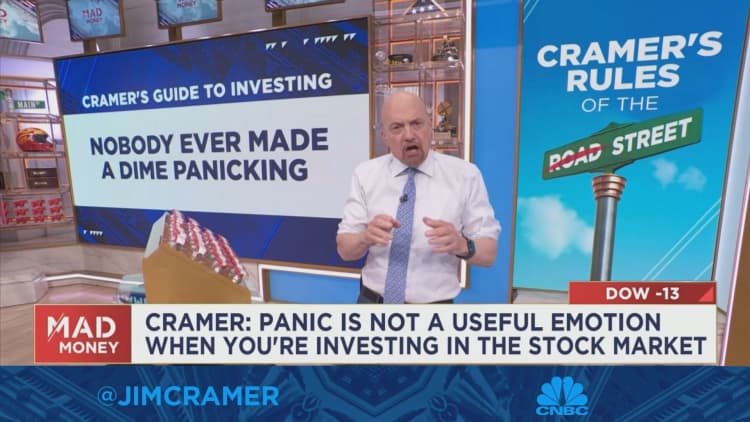
CNBC’s Jim Cramer said panic is neither a helpful emotion nor a proper strategy for the stock market. Great investors know how to ignore their emotions when they get in the way of making money, he asserted.
“If you want to invest wisely, you constantly need to be fighting off your own worst impulses,” Cramer said. “The market gets crushed on a huge down day. People bail at the end of the day. In short, something gets annihilated, and people can’t take the pain, so what do they do? They bolt.”
Cramer recalled the beginning of the Covid-19 panic in spring 2020: The market collapsed, and the S&P 500 lost a third of its value in a little more than a month. Many investors panicked, and many in the industry were convinced the world was ending, he noted. Yet, the S&P 500 was hitting new highs by summer and the market “never looked back” once vaccines became available, recounted Cramer.
Rather than panic selling, Cramer suggested taking a deep breath and waiting for a rebound before selling.
“I am absolutely not saying that every stock that gets hit with a panicked sell-off is worth buying for the long term. Often, when people freak out about an individual company, it’s with good reason,” Cramer said. “But I am saying that, after a big decline, you usually get some kind of bounce, which gives you a better moment to sell if that’s what you want to do.”
Another way to handle a big decline is to be more selective and focused when the market begins to drop, Cramer suggested. Do not defend every single position, he cautioned.
Cramer explained his method for ranking stocks for the CNBC Charitable Trust. Stocks he would buy now are ranked one. Stocks Cramer would buy into weakness are ranked two. Stocks he would sell are ranked three. This way, when things get rough, Cramer can quickly decide which stocks to cut and which ones to defend.
“So, the next time the market gets slammed, please don’t panic. Nobody ever made a dime by panicking. But also, don’t double down on your whole portfolio into weakness,” Cramer urged. “Vicious, negative markets can give you buying opportunities, but you need to focus your capital on your absolute favorites rather than chasing bargains in third-rate merchandise that actually deserves to trade lower.”

